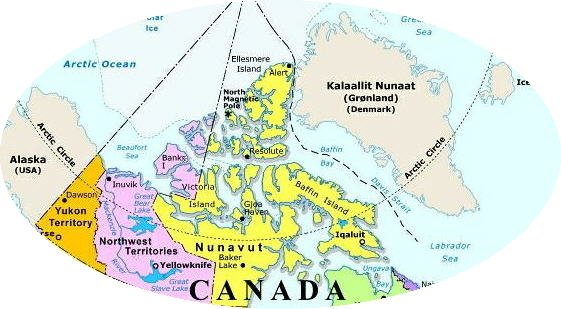
Canada

Canada

Canada

 Full name:
Full name:Dominion of Canada, Canada
 Population:
Population:38,068,549 (Worldometer, June 2021)
 Capital:
Capital:Ottawa
 Area:
Area:,093,507 km2
 Language:
Language:English, French

One of the best international education destinations throughout the world, Canada has much to boast of, thanks to its top colleges and world-class universities. Students and researchers from all over the world flock to its renowned universities for pursuing further education in every discipline. A cutting-edge curriculum, first-class infrastructure, and sprawling campuses are some of the many hallmarks of Canadian educational institutions. In fact, Canada is one of the most sought-after countries worldwide for immigration.
With the education system in Canada being built on the British model, universities here are renowned for high-quality teaching, special attention to research work, close interaction between students and teachers. Since the state controls the Canadian education sector, the standard of educational institutions is really top-notch. Trust the expert overseas study consultants of ABD Education and Migration and pursue the degree of your dreams in Canada.
Counted as one of the leaders in natural sciences, engineering, humanities, and high technological courses, Canada is a study destination like no other. The country attracts thousands of students each year from countries around the world as it provides world-class education that’s globally recognised. Canadian universities support students with the best research ideas and give out a plethora of scholarships to students for their research work.
 Innovative research opportunities
Innovative research opportunities
 Exciting and vibrant campus lifestyle
Exciting and vibrant campus lifestyle
 Immigration possibilities
Immigration possibilities
 Healthy and safe communities
Healthy and safe communities
 Ability work while studying
Ability work while studying

Canada offers a huge range of opportunities for students studying abroad. At ABD Education and Immigration, we help students identify and apply for the best course and the best college that serves as the perfect launchpad for their international career.
 Worldwide Recognition
Worldwide Recognition
Numerous Canadian universities appear in prominent world ranking systems regularly. Getting a degree from Canadian universities is highly recognised and well-valued internationally.
 Warm, Friendly Environment
Warm, Friendly Environment
The United Nations has been constantly ranking Canada as one of the most liveable countries in the world.
 A Safe, Secure Place To Study
A Safe, Secure Place To Study
Canada is one of the safest countries in the world. Regarded as a peaceful, politically stable and a non-violent country, it is one of the safest study abroad destinations.
 A High-Tech Nation
A High-Tech Nation
Canada boost of a highly globalised economy. In fact, it is one of the top ten trading nations in the world. Generally, the educational institutions are located on large campus territories and all of them have modern high-tech equipment, comfy student hostels, and sports halls. Also, the small class sizes and well-qualified faculties make overseas education in Canada interesting, high-quality and effective.
 Affordable Living Costs And Tuition Fee
Affordable Living Costs And Tuition Fee
Canadian education institutions normally charge affordable fees in comparison to other top international study destinations. The cost of studying in Canada is approximately 35-40% more affordable than in Europe and nearly 2 times cheaper than that of the UK. Also, the cost of living in Canada is 20-25% lower than that of the neighbouring US.
 Work During Study
Work During Study
Foreign students can work for 20 hours a week, both on and off campus, once their semester is on and work full-time during breaks. If you’re a married student, your spouse can work full-time while you study. Also, you will be able to gain practical work experience through various internships and co-op work programs.
 Excellent Employment Opportunity
Excellent Employment Opportunity
According to recent statistics, more than 90% graduates of Canadian universities and colleges end up being hired in their field of study just within six months of their graduation. Graduates from a top Canadian university or an educational institution have the opportunity to work in Canada for two years after completing their study. Once the post-graduation work permit is over, students can apply for permanent residency under numerous categories like Canadian experience class, provincial nominee, etc.
 Great Research Value
Great Research Value
Over 200,000 students and researchers from various countries all over the world choose to study in Canada every year for a global career.
 High Living Standards
High Living Standards
Constantly ranked in the top three countries with the highest standards of living, Canada is a country like no other for students wanting to study abroad.
 Practical Approach
Practical Approach
Possibly the main achievement and a major advantage of Canadian education is its orientation to practice. Numerous programs and courses offer paid internships to students during the study period. The key thing here is the fact that students gain practical experience (necessary both for studies and for the resume) and the fact that numerous employers hire students for permanent positions after the internships.
 Canada Is A Bilingual And Multicultural Country.
Canada Is A Bilingual And Multicultural Country.
People from different parts of the world have settled in Canada, thus reflecting the multicultural campus culture of the colleges and universities here. French is used on a par with English. And students can learn one of these languages at the same time.
Cosmopolitan, multi-ethnic, and economically thriving, Toronto is the cultural capital of Canada. A city of migrants, Toronto is completely open to outsiders. It is a dynamic metropolis that’s home to numerous great education institutions. So, it’s no wonder that almost 25% of Canada’s entire foreign student population has selected to study in Toronto.
Greater Montreal in Quebec is the largest province in Canada. Ranked 6th in the world among the best student cities in America (QS 2019), Montreal welcomes approximately 35,000 international students every year. Thanks to its prime location, Montreal has quick access to many major US and Canadian cities. This makes it the ideal place to study, work, and live.
In 2016, Vancouver had topped Mercer’s quality of living survey for North America. It is a position that Vancouver has gotten used to over the recent years. Surrounded by awe-inspiring nature, Vancouver is Canada’s third largest city. If an active lifestyle is what you’re seeking as a study abroad destination, all the while attending a great education institution, Vancouver is the place to be.
Home to some of the top-ranked educational institutions in the world, Canada boost of a strong and well-funded system of public education that’s largely managed provincially. Therefore, certain aspects of the education system could vary between the provinces. But, the federal government oversees the education and thus the quality of education remains high throughout Canada.
Generally, the Canadian education system is divided into three levels like:
 Primary Education
Primary Education
Also termed as elementary school, this level runs from Grade 1 or Kindergarten (ages 6-7) and runs through to Grade 8 (ages 13-14). Normally, the school year runs from September to the following June
 Secondary Education
Secondary Education
Also termed as high school, this level runs from Grade 9 (ages 14-15) to Grade 12 (ages 17-18).
 Post-secondary Education
Post-secondary Education
Canada has an extensive network of top colleges and universities that offer some of the best post-secondary education in the world.
Degrees awarded from Canadian educational institutions are recognised as equivalent to those obtained from other universities worldwide.
 Certificate level, usually for a year
Certificate level, usually for a year
 Diploma level, that lasts for one or two years
Diploma level, that lasts for one or two years
 Advanced Diploma, usually two or three-year programs
Advanced Diploma, usually two or three-year programs
 Bachelor’ degree, awarded after four years of full-time study
Bachelor’ degree, awarded after four years of full-time study
 Post-graduate Diplomas/Certificates, for one Graduate years of study
Post-graduate Diplomas/Certificates, for one Graduate years of study
 Master’s degree, that’s available after a bachelor degree to excel in a subject, for one to two years
Master’s degree, that’s available after a bachelor degree to excel in a subject, for one to two years
 Doctorate or PhD, generally four to seven years
Doctorate or PhD, generally four to seven years
Need financial support for studying abroad? There are a few Canadian institutions that offer scholarships to bright students with excellent academic record. Generally, the amount and type of scholarship depends on the education institution.
Depending on the level of education and the type of institution that you desire to study, the USA application process varies. Therefore, it is important that you find out all the details beforehand.
Book a free counselling with the overseas education experts at ABD Education & Migration to know about the application process in detail.
 Step 1:
Step 1:
Register with ABD Education & Migration and our team will build your profile on the basis of your interests, academic qualifications and work experience.
 Step 2:
Step 2:
Next, we will shortlist the universities and relevant courses as per your profile and interests.
 Step 3:
Step 3:
The completed application will be submitted to the university you have finalised.
 Step 4:
Step 4:
Our experts will assist you for your visa documentation and the acceptance of offer letter
Students applying for Canadian universities are recommended to start their application procedure at least 8-10 months before the intake.
A student visa is often referred to as “Study Permit” in Canada.
Generally, there are three categories where a student can file his/her visa application. These categories are S.P.P., General, and University.
The visa application process for Canada is as under:
 Step 1:
Step 1:
Professional visa advice
 Step 2:
Step 2:
Collect visa documents like:
 Passport
Passport
 Passport-size photographs
Passport-size photographs
 Academic documents
Academic documents
 Test scores
Test scores
 Unconditional letter of acceptance
Unconditional letter of acceptance
 Fees receipt (recommended)
Fees receipt (recommended)
 Scholarship letter (if applicable)
Scholarship letter (if applicable)
 Any relevant correspondence with the institution
Any relevant correspondence with the institution
 Work experience certificates (if applicable)
Work experience certificates (if applicable)
 Financial documents
Financial documents
 Medical report (if already undertaken)
Medical report (if already undertaken)
 Step 3:
Step 3:
Check the provincial guidelines
 Step 4:
Step 4:
Submit your visa application
 Step 5:
Step 5:
Provide additional information or documents
Book your appointment with our overseas education consultants and we will provide all the help you need for your visa application process.
As an international student, you will be allowed to work for 20 hours every week, both on and off campus, when your semester is on and full-time during the vacation.
Once you have obtained your degree, you will be offered a post-graduate work permit, that’s valid for a minimum of one year to a maximum of three years. The validity of your work permit will depend on your course duration. For example, a 1-year degree will lead to a 1-year post-graduate work permit. This will be similar for two and three-year courses. However, if it’s a four-year degree, your work permit will be valid for three years only.
Once your post-graduation work permit is over, you will be able to apply for permanent residency under numerous categories. For instance, Canadian experience class, provincial nominee, etc. or you can even find job abroad in any other country.
| Type of Employment | Description |
|---|---|
| Co-programs | If your academic, professional or vocational training program comprises of an important co-op or internship component, you will have to apply for a work permit. |
| Post-Graduation Work Permit Program (PGWPP) | To work in Canada after your graduation, ensure you apply for a work permit under the Post-Graduation Work Permit Program (PGWPP). If you desire to stay in Canada as a permanent resident after completing your graduate studies, numerous programs are available, each with its specific requirements. |
The tuition fees in Canada are lower when compared to the fees in the UK, Australia, and New Zealand.
 On an average, C$12000 - C$40000 a year depending on the program you choose
On an average, C$12000 - C$40000 a year depending on the program you choose
 Education institution admission fees of C$100
Education institution admission fees of C$100
 Application fees of C$250 (optional)
Application fees of C$250 (optional)
 Visa Fees – C$150 + C$85 for biometric
Visa Fees – C$150 + C$85 for biometric
 Compulsory fees for student services C$500-1000
Compulsory fees for student services C$500-1000
Living cost in the form of GIC – 10,000 CAD
It might cost a student approximately USD600 every month to rent a room off-campus and approximately USD2000 every month for an apartment.
Popularly known as SPP, Student Partners Program is an administrative framework designed jointly by the Citizenship and Immigration Canada (CIC) and Association of Canadian Community Colleges (ACCC). SPP streamlines the admission process and visa process for the Canadian Community Colleges and increases the number of visas that are issued to international students.
 Algonquin College
Algonquin College
 Assiniboine Community College
Assiniboine Community College
 Bow Valley College
Bow Valley College
 Cambrian College of Applied Arts & Technology
Cambrian College of Applied Arts & Technology
 Camosun College
Camosun College
 Canadore College
Canadore College
 Centennial College of Applied Arts & Technology
Centennial College of Applied Arts & Technology
 College of New Caledonia
College of New Caledonia
 College of the Rockies
College of the Rockies
 Columbia College
Columbia College
 Conestoga College
Conestoga College
 Confederation College of Applied Arts & Technology
Confederation College of Applied Arts & Technology
 Douglas College
Douglas College
 Durham College
Durham College
 Fanshawe College of Applied Arts & Technology
Fanshawe College of Applied Arts & Technology
 Fleming College
Fleming College
 George Brown College
George Brown College
 Georgian College of Arts & Technology
Georgian College of Arts & Technology
 Humber College Institute of Technology & Advanced Learning
Humber College Institute of Technology & Advanced Learning
 Kwantlen Polytechnic University
Kwantlen Polytechnic University
 Lakeland College
Lakeland College
 Langara College
Langara College
 Lambton College of Applied Arts & Technology
Lambton College of Applied Arts & Technology
 LaSalle College Loyalist College of Applied Arts & Technology
LaSalle College Loyalist College of Applied Arts & Technology
 Manitoba Institute of Trades & Technology
Manitoba Institute of Trades & Technology
 Medicine Hat College
Medicine Hat College
 Mohawk College of Applied Arts & Technology
Mohawk College of Applied Arts & Technology
 Niagara College
Niagara College
 North Island College
North Island College
 Northern Alberta Institute of Technology
Northern Alberta Institute of Technology
 Northern College
Northern College
 Northern Lights
Northern Lights
 NorQuest College
NorQuest College
 Okanagan College
Okanagan College
 Parkland College
Parkland College
 Red River College of Applied Arts, Science & Technology
Red River College of Applied Arts, Science & Technology
 Saskatchewan Polytechnic
Saskatchewan Polytechnic
 Sault College
Sault College
 Selkirk College
Selkirk College
 Seneca College of Applied Arts & Technology
Seneca College of Applied Arts & Technology
 Sheridan College Institute of Technology & Advanced Learning
Sheridan College Institute of Technology & Advanced Learning
 St. Clair College of Applied Arts & Technology
St. Clair College of Applied Arts & Technology
 St. Lawrence College
St. Lawrence College
 University of the Fraser Valley
University of the Fraser Valley
 Vancouver Community College
Vancouver Community College
 Vancouver Island University
Vancouver Island University